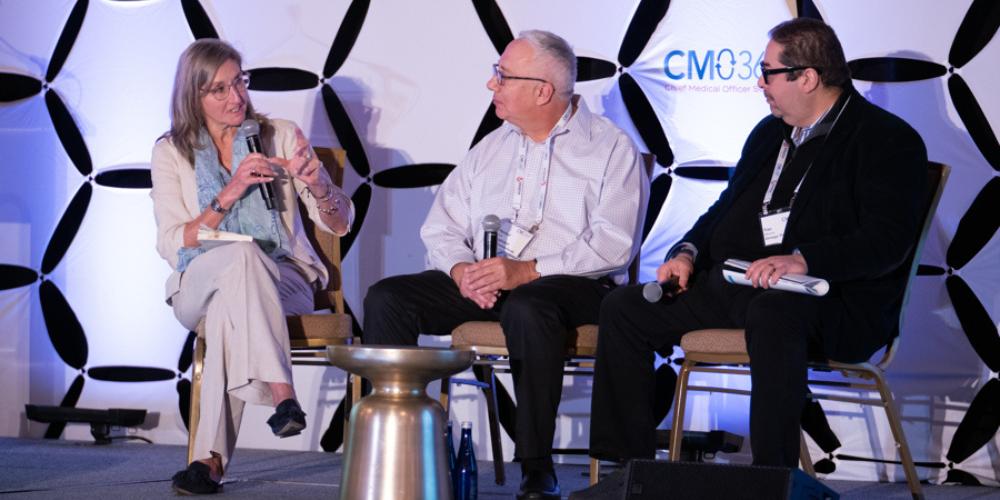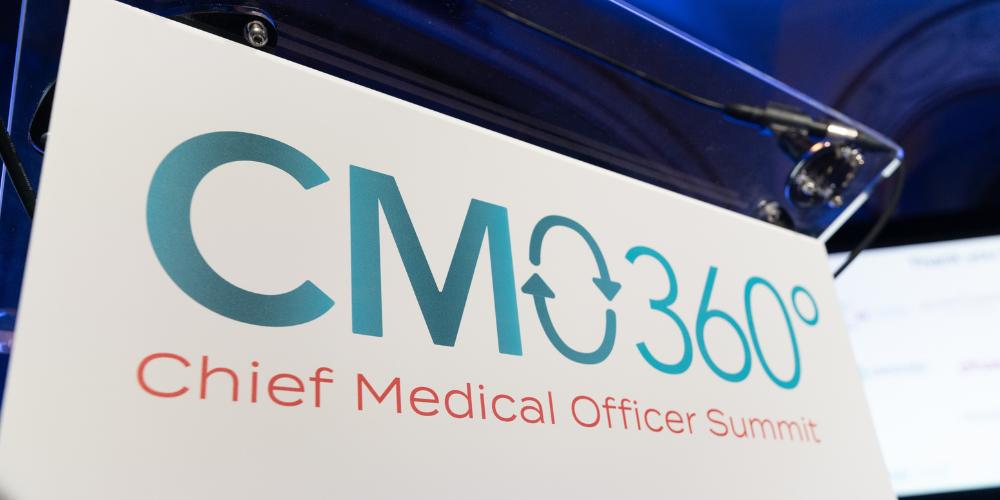
Ted Myles, MBA is the CFO and Head of Business Operations at Scholar Rock.
Can you describe the work you do with Scholar Rock?
I joined Scholar Rock’s board of directors in November 2018. In July 2020, I stepped off the board and joined the management team. I had an inside view from a board capacity and really got to know the leaders of the company and understand the scientific platform. It is unusual to have that rich of an understanding of what you’re jumping into. I was excited to step in alongside our new CEO, Tony Kingsley. I had gotten to know Dr Yung Chyung, our CMO, very well over the preceding 18-20 months.
In my role as CFO at Scholar Rock, I try to approach as an enterprise leader. I strive to understand the priorities and needs of other leaders and employees throughout the company. I am more effective if I understand their perspective and what drives the company forward, not just from a finance function but from a horizontal enterprise view. Having said this, as CFO and Head of Business Operations, my foremost responsibilities boil down to ensuring that our company is well capitalized, we have a sound financial strategy and we’re deploying our shareholder capital in a prudent and responsible manner. We are stewards of shareholder capital. I want to help the company make decisions that are aligned with shareholder interests. This is a really important link in the CFO/CMO relationship. I may start with the shareholder perspective and the CMO starts with the patient perspective but we ensure that these are aligned. If we’re serving patients well, shareholders will be rewarded. Then we get to access more capital to further serve patients as we continue to invest in our scientific platform.
What does your day-to-day look like?
It’s constantly different. If you look at this past week, on Monday and Tuesday we attended the Cowen Healthcare Conference. We were in meetings with existing and prospective investors all day. The next three days were largely internally focused. I spent a lot of time with colleagues across the company finalizing our year-end audit, as well as finalizing and getting ready to file our 10-K. I spent a lot of time with program teams and functional leads working to finalize the year-end goal cascade. Our board has already approved our corporate goals: a list of 6-8 goals that we focus our energy on and which drives the budget. We spend a lot of time cascading that down so every function and individual knows their role in achieving those corporate goals.
What are the different hats you wear as both CFO and Head of Business Operations?
I’m responsible for the financial function and that tends to be broad within a biotech company. It usually includes IT, financial planning and analysis, accounting and reporting, IR, communications, and corporate affairs. I also oversee the technical operations and supply chain functions at the company. I am responsible for program management and helping to drive the programs forward as we advance. With an overarching corporate view, I try to gain as much perspective across the company as I can to make sure that we’re deploying capital in the most efficient manner in the service of patients.
"When we do good things for patients, our stockholders are rewarded and we therefore get more access to capital so we can continue to do good things for patients."
How can CMOs best support their CFOs?
First and foremost is passion. The culture of Scholar Rock is focused on discovering great science and being curious about new science. The end of the sentence is always, “in service of patients.” This comes back to my role as deployer of shareholder capital efficiently and effectively. I start with the stockholder perspective. Dr Chyung always comes with a patient focus. These are inextricably linked objectives. When we do good things for patients, our stockholders are rewarded and we therefore get more access to capital so we can continue to do good things for patients. That’s the simplest way to boil down not only the essence of the biotech business but also the relationship between the CMO and CFO.
What would your advice be to CMOs who want to learn more about financing?
There’s a lot there. If it’s a new company, you want to create a clear company mission driven by science aligned with serving patients. Everything the company does should emanate from that mission. Scholar Rock has cutting edge science translated into what we hope will be very important novel medicines for patients in need. We think that our two lead programs in spinal muscular atrophy and immuno-oncology could make big impacts in patient lives.
Starting from that, investor relations and running a financing is very much a relationship business. Investors want to invest in relationships with their executive teams. We put a lot of time and effort into developing these relationships. We are stewards of shareholder capital. The better the relationship, the better the mission and the better the investors understand the mission, the higher the likelihood of attracting capital for the company. There are a lot of mechanics in running a financing but it starts with a really clear, differentiated mission and developing long-term relationships with investors.
Oftentimes, people view financings as transactions. While the moment in time is a transaction, it is preceded and followed by a significant amount of relationship building. We want our investors to understand what we’re doing. We’ve been blessed with a lot of good news. You need to continue to invest in a relationship and be transparent whether the news is good or bad. Focus on the long-term investment.
Recently, the executive team presented to the whole company. We talked about what I call ‘the virtuous cycle of thriving biotech.’ A lot of companies, like Scholar Rock, start with a great research idea that drives the novel science. In some cases, that novel science leads to experiments with human patients – clinical trials. In some cases, those clinical trials lead to good data. That good data can demonstrate that we might be doing good things for patients which leads to good outcomes for investors which brings on more capital. I made that point in the all-company meeting to firmly drive home my belief that everybody in the company has a place in that cycle, whether you’re in the research group, clinical or development team, finance, or administrative support functions of the company.
A tangible recent example: We had a very successful follow-on financing last October. It was viewed by many as one of the best follow-on financings of biotech for 2020, which was a busy and successful year for biotechs. To bring that virtuous cycle to life, it started many years ago when our scientists decided they could design antibodies in a way that would downregulate myostatin. They thought that with our unique platform, we could do this better than anyone else. A little while later, Dr Chyung and his team decided they could help patients with SMA. They designed a phase I and now the ongoing phase II TOPAZ study to explore this hypothesis. We received and unveiled six months of data as part of the twelve month study and the data was positive and we believe demonstrated proof of concept. We unveiled that news to our investors and the stock reflected the clinical results. We were well prepared for the financing, having high engagement with investors leading up to this milestone. We raised $230 million not only from our existing investors who have been very supportive but also from a lot of new investors who we had been developing relationships with for a long time. We took that capital and are pouring it right back into the company to advance not only our SMA program but also our immuno-oncology program and some of the preclinical programs and to support structure within the company to continue to advance the science. I couldn’t have done it without Dr Chyung and his team. Dr Chyung couldn’t have done it without me and my team. The virtual cycle came to life.
"Being very transparent about the good and the bad is how you not only develop relationships but also continue to learn from experiences."
How can you best deliver bad news to investors?
If you have a long enough career in biotech or pharma, inevitably, you’re going to experience some bad news. We are stewards of shareholder capital. We are using our best judgement to deploy it and run experiments and discharge risk that will help advance and prove our concepts that we think can develop medicines to help patients. In some cases, it doesn’t go the way we want and hope. Importantly, as you’re building these investor relationships, you want to share the good news in a balanced and fair manner and you want to share the bad news in a balanced and fair manner. Being very transparent about the good and the bad is how you not only develop relationships but also continue to learn from experiences.
Sometimes the science doesn’t work. I had the chairman of a company many years ago who said, “The cells don’t know what they’re supposed to do, they just do what they do.” But you can control how you present, how you run the company and how you engage with your constituents, not just shareholders but the patient community, your employee base and the broader biotech community around your company. At Scholar Rock we were blessed with really good news and we hope that continues but we have to be transparent in all situations.
What do you now know that you wish you knew when you first entered the biotech space?
I try to be an active learner at all times. One of Scholar Rock’s key principles is curiosity. I tend to ask a lot of questions and I am always trying to learn a bit more. One of the fascinating things about working in a biotech is that we’re trying to do things where the answer isn’t known yet. That screams curiosity.
I’m fortunate that our CMO and CSO are very patient. I spent a lot of time in my first couple of months with the company carving out time with each of them weekly to ask kindergarten-level science questions to understand the science better. I appreciate their patience and I think they appreciate my curiosity.
You learn from working with people and from doing new things. I’ve done a lot of financings but each one tends to have its own flavor and differences so I try to carry lessons learned onto the next one.
How does your perspective change transitioning from a board member role to joining the management team?
One of the values of a board member is that they are not involved in the day-to-day operations. They are well aware and up to speed around the company’s challenges but it’s periodic. You can get a fresh perspective. As a board member, you see the forest for the trees. When I was on the board I tried to offer that perspective.
Now that I’ve jumped in as a full-time executive, I am in it day-to-day and rely on the board for that fresh perspective. Occasionally we’ll reach out to a board member and stress test some thinking. I’ve always gained from that type of dialogue. Once you join a company as a full-time executive, you’re in it and have a big responsibility with the rest of the executive team for the employees, the patients we serve, and our stockholders to make the best decisions for their benefit. That is morning, noon and night.
Anything else?
That partnership between the CMO and CFO is so important. C-level people get to the C-level because they’re good at their function. What keeps you strong at the C-level is not being as functionally oriented but being enterprise oriented. Dr Chyung and I have different trainings, upbringings and backgrounds but we’re completely unified in our view of the virtuous cycle. Keep that virtuous cycle and common goal front of mind.








